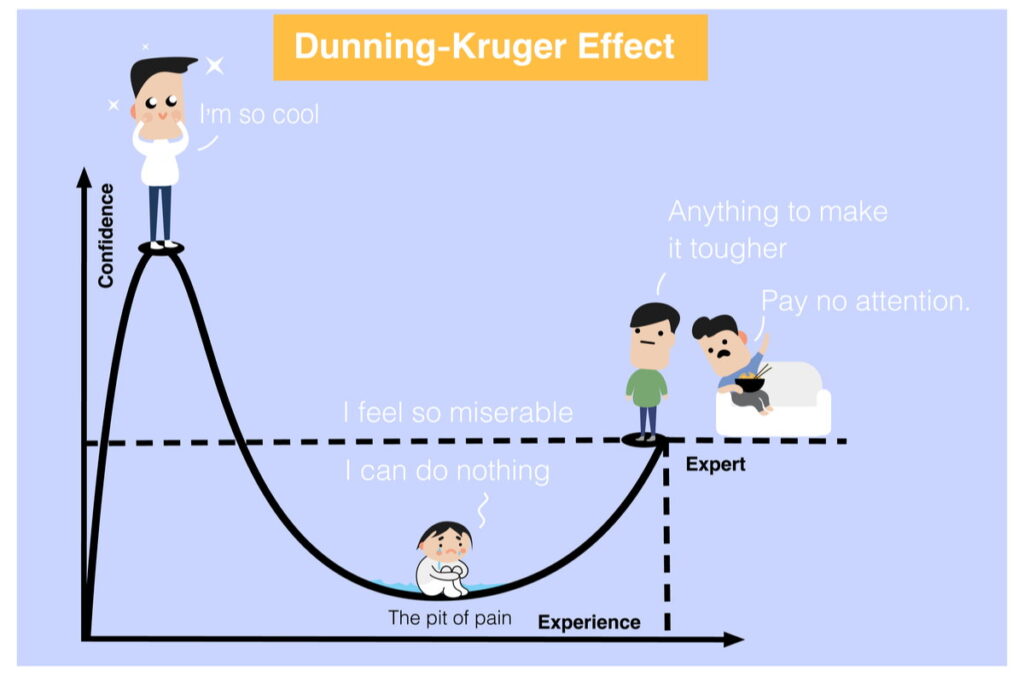
Introduction to the Dunning-Kruger Effect
The Dunning-Kruger effect is a psychological phenomenon that occurs when people with low competence in a particular field tend to overestimate their abilities and believe they are much more competent than they actually are. This phenomenon was identified and studied by Professors David Dunning and Justin Kruger of Cornell University.
Understanding the Paradox of Ignorance The paradox of ignorance is at the heart of the Dunning-Kruger effect. People with limited knowledge on a certain topic often cannot recognize their own incompetence and, as a result, overestimate their abilities. This can lead to incorrect decisions and an illusion of competence that can have negative consequences both individually and organizationally.
The reason behind this paradox is that when one has very limited knowledge on a topic, they are also unaware of how little they know. This lack of awareness can create a sort of competence illusion, where one feels confident in their abilities despite contrary evidence.
The Cognitive Bias Underlying the Dunning-Kruger Effect The Dunning-Kruger effect is fueled by a cognitive bias known as the “illusion of superiority.” This bias leads people to overestimate their abilities and underestimate those of others. People affected by this bias tend to have a distorted view of reality and believe they are better than they actually are.
One of the reasons this bias occurs is that people tend to compare themselves with those who have an even lower level of competence. This creates an illusion of superiority, where one thinks they are exceptional compared to others, even if their actual competence level is very low.
Examples of the Dunning-Kruger Effect in Everyday Life The Dunning-Kruger effect can be observed in many contexts of everyday life. For example, it’s common to see people who claim to be experts on a topic just because they heard about it once or read an article on it. These people can be very confident in their opinions, despite having a superficial or distorted knowledge of the topic.
Another example is people who participate in competitions or races without having real competence in the field they are measuring themselves in. These people may be convinced they have great skills, but often realize their incompetence only when compared to real experts.
Implications of the Dunning-Kruger Effect for Business Success The Dunning-Kruger effect can have significant implications for business success. When people overestimate their abilities and are unaware of their shortcomings, they can make wrong decisions that can harm the company. Moreover, the lack of awareness of one’s limitations can prevent people from seeking improvement and acquiring new skills.
How the Dunning-Kruger Effect Influences Decision Making in the Workplace In the workplace, the Dunning-Kruger effect can negatively influence decision-making. People who overestimate their abilities may be more inclined to make hasty decisions and ignore the opinions of others, believing theirs is the best. This can lead to costly mistakes and conflicts within the team.
Overcoming the Dunning-Kruger Effect in the World of Work To overcome the Dunning-Kruger effect in the world of work, it’s important to promote awareness of one’s limitations and encourage humility and the pursuit of improvement. Companies can adopt strategies such as continuous training, mentoring, and encouraging knowledge sharing to help people realize their incompetence and develop stronger skills.
Recognizing and Addressing the Dunning-Kruger Effect in Team Dynamics Recognizing and addressing the Dunning-Kruger effect in team dynamics is crucial for team success. It’s important to create an environment where people feel free to express their opinions and share their knowledge, without fear of being judged or perceived as incompetent. Additionally, promoting collaboration and constructive comparison can help mitigate the negative effects of the Dunning-Kruger effect.
The Importance of Self-Awareness in Countering the Dunning-Kruger Effect Self-awareness is crucial to counteract the Dunning-Kruger effect. Being aware of one’s limitations and knowledge can help make more informed decisions and seek continuous improvement. Honest self-assessment of one’s abilities can help avoid costly mistakes and promote a continuous learning environment.
Conclusions: Embracing Humility and Continuous Learning for Business Success In conclusion, the Dunning-Kruger effect is a psychological phenomenon that can have significant implications for business success. Understanding this effect and recognizing it can help individuals and organizations make more informed decisions and promote a work environment based on humility and continuous learning. By developing self-awareness and always seeking to improve, it’s possible to overcome the Dunning-Kruger effect and achieve lasting business success.
CTA: To learn more about the Dunning-Kruger effect and how to address it in the world of work, read our article on the topic and discover how to promote a company culture based on humility and continuous learning.